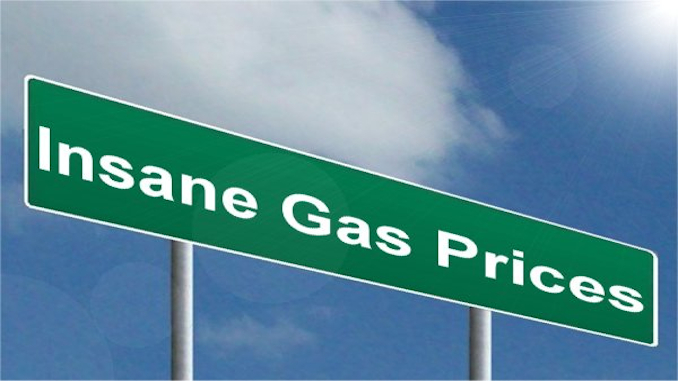
By John Friend
With pressure mounting from a bipartisan coalition in Congress to enact even harsher economic sanctions against Russia, President Joe Biden announced yesterday that all Russian energy imports would be banned in the United States.
“Today I’m announcing the United States is targeting the main artery of Russia’s economy,” President Biden announced in the Roosevelt Room at the White House. “We’re banning all imports of Russian oil and gas and energy. Russian oil will no longer be acceptable at U.S. ports and the American people will deal another powerful blow to Putin’s war machine.”
We're banning all imports of Russian oil and gas and energy.
That means Russian oil will no longer be acceptable at U.S. ports and the American people will deal another powerful blow to Putin.
— Joe Biden (@JoeBiden) March 8, 2022
Many are wondering who the ban will hurt more – the Russian regime or the average American and European consumer as energy prices rise to new heights.
President Biden made clear that the ban “is a step that we’re taking to inflict further pain on Putin,” but warned “there will be costs as well here in the United States” as gas prices soared to $4.25 per gallon on average in the U.S., an all-time high according to analysis provided by AAA.
Earlier this morning, Kremlin spokesman Dmitry Peskov described the U.S. sanctions and other Western corporate boycotts of Russia as a form of economic war being waged against Russia.
“The US has certainly declared economic war on Russia, and they are waging this war,” Peskov stated. “Yes, de facto, they are.”
Russian officials have repeatedly warned that banning energy resources exported to the West, especially Europe which relies heavily on Russian natural gas, oil and other energy resources, would have a “catastrophic” impact on global energy markets. According to a report from ABC News, the U.S. imports roughly 8% of its total oil and petroleum products from Russia. Meanwhile, roughly 40% of Europe’s total supply of natural gas currently comes from Russia along with 25% of its oil.
On Monday, Russian deputy prime minister Aleksandr Novak cautioned that banning Russia energy exports on the global market would result in skyrocketing energy costs across the board, potentially sending the cost of oil to over $300 per barrel. It currently trades for roughly $120 per barrel. Western politicians, including President Biden, have repeatedly blamed soaring energy prices across the world on Russia and Putin, a fanciful claim which Russian leaders continue to deny.
I'm going to do everything I can to minimize Putin's price hike here at home. pic.twitter.com/UT1V4DIuNd
— Joe Biden (@JoeBiden) March 9, 2022
European and American officials are “once again seeking to put all the blame for their own recent energy policy shortfalls on Russia,” Novak explained in a press conference. “Russia has nothing to do with the current price hike on market volatility.”
Novak also warned his Western counterparts that Russia has the ability to “reroute” its energy products to other markets, particularly Asian countries who are eager for energy products, but noted that Russia had been a “reliable partner” for Europe’s energy needs for decades.
In response to President Biden’s announcement, Putin signed “a decree introducing special economic measures in foreign trade for ensuring Russia’s security,” according to Interfax, a Russian-based financial and news service. “The decree introduces certain special economic measures to be in effect until December 31, 2022,” including potential bans of Russian exports to certain countries and bans on imports of certain products from foreign countries, a move calculated to punish countries engaging in economic warfare against Russia.
“The Russians have decided to hit back hard at everybody who is sanctioning them,” Gonzalo Lira, a geopolitical commentator with close ties to Ukraine, recently noted. “This will mean that Europe will go cold and hungry for the rest of this year.”
President Biden and American diplomatic officials have been desperately reaching out to some of the world’s largest energy producers and exporters, including Venezuela, Saudi Arabia and the United Arab Emirates, in an effort to minimize the price of oil in the wake of Western economic sanctions on Russia. According to recent reports, Saudi and UAE officials have refused to respond to U.S. officials and their demands.
They both took calls from Putin
— ASB News / MILITARY〽️ (@ASBMilitary) March 9, 2022



